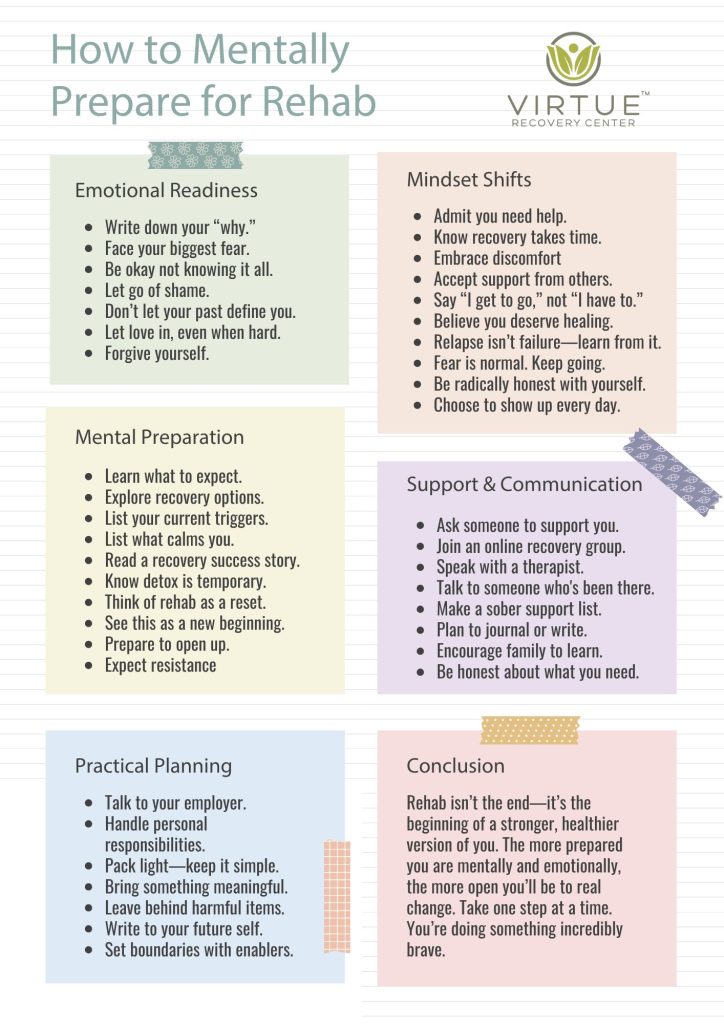Key Takeaways
- Preparing your mind before rehab can make the journey easier and more successful.
- Facing fears, being honest with yourself, and building support are key.
- Mental and emotional readiness helps you feel more in control when entering treatment.
- Knowing what to expect takes away some of the fear of the unknown.
- With the right mindset, you’re already taking the first step toward healing.
Introduction
The decision to seek treatment for drug or alcohol addiction is a big step. It’s not easy. It takes strength to admit you need help on your path to recovery at an alcohol and drug rehabilitation center. But when you decide to enter drug and alcohol rehab, you’re choosing life. You’re choosing hope. Still, it’s normal to feel nervous or unsure. That’s why mentally preparing for rehab is so important. It helps you feel more ready and less afraid. It gives you tools to handle what’s ahead. This guide will show you how to get your mind and heart ready for the journey. Because when you prepare, you give yourself the best chance for a strong and lasting recovery.Why Mental Preparation Matters Before Rehab
Going to attend rehab isn’t just about stopping drugs or alcohol. It’s also about healing your mind and learning new ways to live. That kind of change takes more than just physical strength—it takes mental and emotional readiness. When you mentally prepare, you:- Know what to expect
- Understand your feelings better
- Feel less overwhelmed
- Can focus more on healing
Emotional Readiness: Letting Go and Opening Up
Before rehab in an addiction treatment center, it helps to let go of heavy emotions that might be weighing you down. Guilt, shame, or fear can block your path. You don’t have to have it all figured out—but being willing to try makes a huge difference. Here are a few steps to emotionally prepare:- Write down your “why.” Why do you want to get better?
- Face your biggest fear. Say it out loud or write it down.
- Let go of shame. You’re human, and you deserve help.
- Forgive yourself. You’ve made mistakes, but that doesn’t define you.
- Let love in. Allow others to care, even when it feels hard.
Mental Preparation: What to Expect and How to Plan
Knowing what to expect can ease a lot of the fear about going to a rehab center. Most rehabilitation programs follow a structured plan that includes detox, therapy, group support, and sometimes family sessions. Here are a few ways to prepare mentally:- Read about the rehab process. Knowledge makes it less scary.
- Write down your triggers. Knowing them helps you stay alert.
- List what calms you. These will be tools you use in rehab.
- Understand that detox is temporary. It’s tough, but it passes.
- See rehab as a new beginning, not a punishment.
- Expect resistance. Your brain may fight change. That’s normal.
Shift Your Mindset: New Ways to Think About Recovery
Changing your mindset can make all the difference. Instead of thinking about what you’re giving up, think about what you’re gaining—peace, health, and freedom. Try these shifts:- Say “I get to go,” not “I have to go.”
- Know that healing takes time. You don’t have to rush.
- Accept support from others. You don’t have to do this alone.
- See relapse as a lesson. It’s not failure—it’s a step in learning.
- Remind yourself: you deserve this. You are worthy of healing.
Build Your Support System Before You Enter Rehab
Recovery is tough, but having people by your side makes it easier. A strong support system helps you stay grounded and motivated. Here’s how to build your support:- Ask someone you trust to support you.
- Join an online recovery group.
- Speak with a therapist or counselor.
- Talk to someone who has been through rehab.
- Make a list of people who support your sobriety.
- Encourage your family to learn about addiction.
- Be honest about what you need.
Practical Planning: Handling Life Before Rehab
Before you go to a treatment facility, you may need to take care of everyday things. That way, you can focus 100% on your recovery once you’re there. Things to take care of:- Talk to your boss or use the Family and Medical Leave Act (FMLA).
- Handle bills, childcare, or other responsibilities.
- Pack light. Bring only what you need.
- Take something meaningful with you. A photo or journal can help.
- Leave harmful items or reminders behind.
- Write a note to your future self. It can be your reminder on hard days.
- Set boundaries with people who don’t support your recovery.
Infographic Checklist: How to Mentally Prepare for Rehab
Use the guide below as a quick visual reminder. It breaks down everything we’ve talked about into small, clear steps you can follow before entering rehab. Save it to your phone, print it out, or share it with someone who needs it.
Conclusion
Starting rehab is one of the bravest decisions you can make. It’s not the end—it’s the beginning of a healthier, stronger you. The more mentally and emotionally prepared you are, the more open you’ll be to real change. You don’t have to be perfect to start. You just have to start. If you’re ready to take that step, Virtue Recovery Las Vegas is here to walk with you. Our team is ready to support your journey with compassion and care. Call 866-520-2861 today to start your recovery journey. You’re not alone—we’re here to help.How Can Developing Healthy Habits Help in Mentally Preparing for Drug and Alcohol Rehab?
Developing healthy habits is essential for mentally preparing for drug and alcohol rehab. By integrating healthy recovery practices into daily life, individuals can build resilience, improve emotional well-being, and foster a positive mindset. These habits create a solid foundation, enhancing motivation and support during the challenging journey of rehabilitation.








